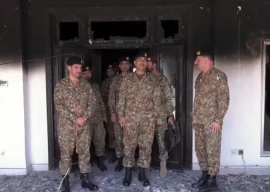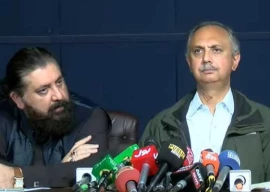
The district was known as Nawabshah before it was renamed after the ruling Pakistan Peoples Party’s slain chairperson, Benazir Bhutto, in April 2008.
The Indus River flood waters were passing through 55 miles of the district, which till the last count was at a dangerous rate of 700,000 cusecs. The gushing water is being held back from entering the main cities of central Sindh by two embankments in Qazi Ahmed tehsil, Mudh and Mikaro bundhs. However, it has begun to drown around 54 villages in the kachcha that house more than 46,000 people.
Executive divisional officer for revenue and representative of the Provincial Disaster Management Authority, Zahoor Hussain, said the best facilities are on offer at the 20 camps set up by the government in Benazirabad. “There are now close to a thousand affected people in our camps. About 519 are in Sakrand and 313 in Qazi Ahmed tehsils alone,” he said. Pakistan army’s Colonel Zia said his troops were in their area for relief efforts. “Everything is under control and we are also providing cooks at the camps,” he said.
Senior irrigation official Abdul Aziz Junejo said “if history is taken into account, around 900,000 cusecs of water passed through the Mudh bundh in 1992 and this catastrophe too will pass without wreaking havoc. And this is all because we have made the best possible arrangements to deal with any situation.”
However, former nazim Gohram Morri town Kamal Khan Jatoi says people are not going to the camps because they are disgusted with the arrangements. “All government claims of hundreds of people in camps are bogus.”
And this becomes evident as one visits Majeed Keerio village in Sakrand, which is hardly ten minutes away from where Junejo was stationed. The Majeed Keerio Government High School has been turned into a relief camp and officials claimed that dozens of people were stationed there. However, the only people found there were education department officials, who were preparing Iftari for themselves.
Dirty rugs were placed in empty classrooms and four empty deghs stood in a room that was home to eight police constables. “They left just moments before you arrived,” said Ghulam Hussain, an education official, referring to the supposed flood victims who were staying there.
The situation was similar at the Government Higher Secondary School and Government Main Primary School in Qazi Ahmed.
There were reports of 250 people in a camp set up at the Government High School Bachal Pur. Camp supervisor Abdul Qadir Khosa said he had forms to prove that the number was in fact higher. However, the only way he could explain the presence of only 20 people in his relief set-up was by saying “They have gone out for an evening walk and will come back shortly.”
Out of those 20, one was Mohammad Safar said:“I’m terrified of my zamindar more than the flood,” he said, explaining that he had taken loans from his landlord for growing crops on his Kachcha area. “Now that I’ve lost all my belongings and my crops have been destroyed, I fear that my family and I will be cut into pieces for not being able to pay him back,” he said, while his relatives, nodded in agreement. Safar was too afraid to even name his landlord whom he owes Rs60,000.
Officials and locals off the record informed The Express Tribune that this was one of the most pressing issues concerning the migrants. The poor peasants live in the kachcha that is actually under the control of influential landlords. They then take loans to grow crops on the land, half of which is given to the owner, while the rest is kept by them, said one expert, adding that the landlords show no mercy and are likely to do everything in their power to get their money back. Some of the biggest land owners in Benazirabad today are the Zardari, Jatoi, Syed, Bangwar and Brohi clans.
Adviser to Sindh chief minister Sharmila Farooqi says she does not blame people like Safar for being afraid for their future. “But at the moment, the government’s priority is to save the people who are going to be affected by the approaching floods in lower Sindh.” She added that the government was aware of the problem and hoped that the landlords would show mercy towards their people who had already lost everything in the floods.
Published in The Express Tribune, August 15th, 2010.












1734899716-0/image-(15)1734899716-0-270x192.webp)










COMMENTS (2)
Comments are moderated and generally will be posted if they are on-topic and not abusive.
For more information, please see our Comments FAQ